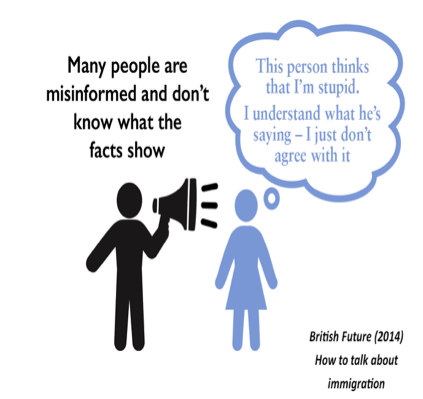In this opening section of the Guidelines on Reframing Migration Narratives, we will set out the populist challenge facing progressives in Europe and why their normal approaches to communicating about migration to public audiences are not working so well. Lastly, we will outline the risks of not changing our approaches.
Populist narratives are gaining ground in the migration debate
The migration debate in Europe is getting more polarised and populists are gaining ground with ‘othering’ narratives that scapegoat and blame refugees and migrants for larger societal problems. The debate has becomes increasingly heightened and emotional, where leaps of logic to old fear-driven stories are becoming the norm, with seemingly little will to interrogate the facts of what is really happening. Old stories or frames (e.g. deprivation – clash of cultures) are becoming part of the dominant discourse and such narratives are the bread and butter of increasingly influential populist parties and opinion makers throughout Europe. In the midst of post austerity anger over broader issues of inequality and falling public trust in political institutions, these parties seek to hijack these concerns and place the blame on one issue: migration and inclusion[1].
The potential mainstreaming of populist views will set the boundaries of policy choices
With the increasing traction of this populist post-austerity blame game, many more mainstream politicians have dangerously and opportunistically begun to adopt this line. This mainstreaming of the anti-migrant discourse presents a great danger because the public narrative sets the boundaries for ‘acceptable’ policy choices[2]. So, if the only story around migration is threat and invasion, then the only solutions on the table will be security, fences and exclusion.
Standard progressive responses are missing the mark in public debates
Seeing the challenge as straightforward, pro-migrant constituencies have tended to argue facts and rights, e.g. the long-term economic benefits of migration and international commitments on the right to asylum. These arguments have traction in policy circles and among those who are already supporters, but in the charged public debates, don't seem to work too well. In fact, we often get dismissive, angry responses. Some report our approach comes across as arrogant and lectury, with audiences left feeling that we think them a bit stupid or even a bit racist[3].

Angry responses mean spokespeople are less inclined to stay involved in the public debate
These angry responses mean that spokespersons/campaigners with progressive views are staying out of the debate, as they don’t know how to respond and end up only ‘preaching to the converted’. Another approach is to push even harder on the same lines and stronger attacks can even create a backfire effect, strengthening populist association and thinking.
Reframing the way out
In emotionally heightened discussions such as this one, the values, concerns and emotional investment of stakeholders become an important gateway to real dialogue and engagement[4]. At the core of our work in this area is the challenge of frames that can be triggered by a photo, a metaphor or phrase and lead us to a full story on the nature of the issue, who’s to blame and solutions. For example, the UK Prime Minister Cameron’s use of the word “swarm” of migrants in 2015 needed no other explanation to trigger a whole set of negative connotations[5].
For those who wish to expand the debate to include diversity-driven policy choices, there is a need to engage the so-called 'anxious middle' better and at least, put another frame or narrative on the table and hopefully, win over those in the middle and broaden the debate out to have more inclusive options back on the agenda. Many progressive migration projects and campaigning organisations have already taken this route and had considerable success in the past 15 years[6]. We would encourage you to consider adding this to your advocacy strategies also.